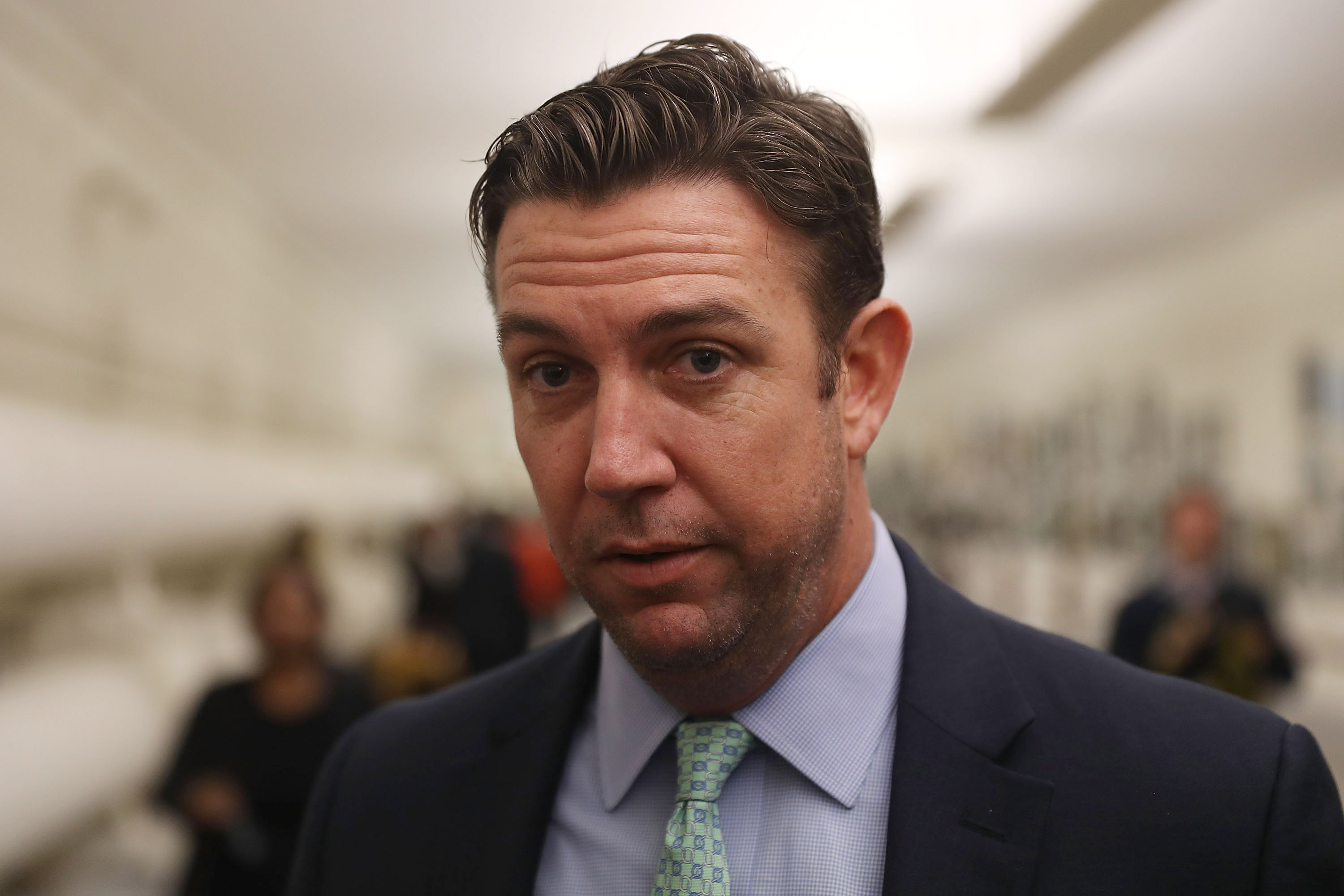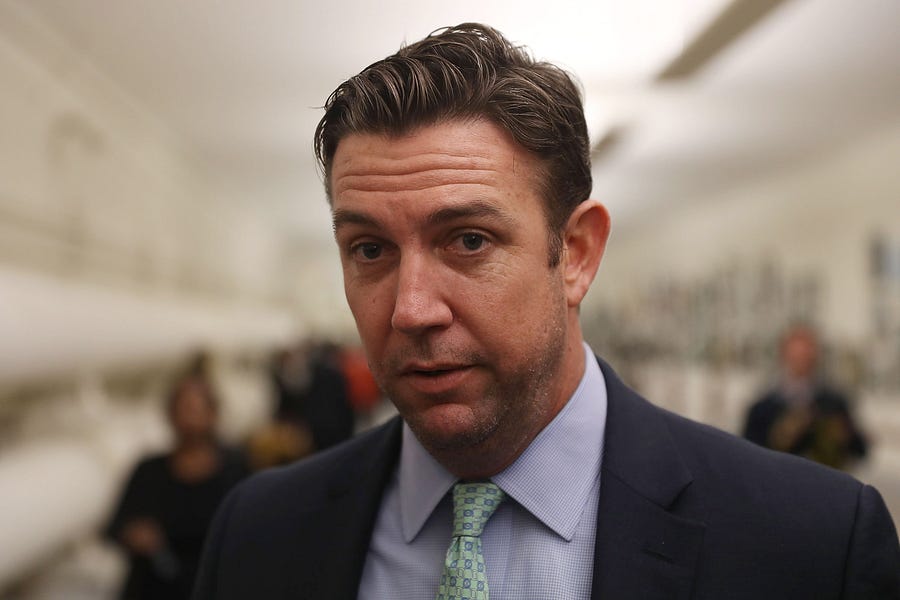
Duncan Hunter is done in Congress. The congressman and retired Marine from San Diego County, who took over his father’s seat after he retired in 2009, announced his resignation Tuesday in a letter to House Speaker Nancy Pelosi, in which he detailed at length his greatest accomplishments in public life.
“Since the day I joined the Marines in the aftermath of 9/11, I have had the honor of serving my country, both at home and abroad,” Hunter wrote. “During my time in Congress, I had the privilege of helping thousands of individuals in my district—from making sure veterans received the benefits they earned, to helping Social Security and Medicare recipients cut through red tape, to assisting immigrants seeking legal citizenship, and countless others going up against the IRS, ATF, or other government agencies.” He went on to detail his committee and subcommittee work, including the contribution he was “most proud of”: his work on the House Armed Services Committee.
Left unspoken was the reason for his untimely departure. In December, Hunter pleaded guilty to federal corruption charges related to his misuse of hundreds of thousands of dollars in campaign funds. The charging documents detailed expenses ranging from the merely seedy—Hunter having the campaign pick up his hefty bar tabs—to the outrageous, like scheduling a trip to a U.S. naval base in Naples so he write off an international family vacation as a campaign expense.
Indicted on 60 charges in the summer of 2018, in the end he pleaded guilty to only one. The government will seek a single year in prison when he is sentenced in March. When he has spoken publicly about the case—something he has done only a few times since he took the plea—Hunter has taken pains to remind everyone he never misappropriated taxpayer dollars. Which is true.
In a way, the omissive letter made for a fitting conclusion to Hunter’s congressional service. For the past few years, after all, he has essentially led a double political life. There is Duncan Hunter as he was in the national public eye, an almost comically villainous character: throwing his wife under the bus on national TV (“she handled my finances … that’ll be looked into, I’m sure, but I didn’t do it”), dismissing the case as a politically motivated witch hunt almost right up to the point where he took the plea, running a xenophobic smear campaign against his 2018 opponent, Ammar Campa-Najjar.
But there was also Duncan Hunter as many Republicans in his district saw him: a well-liked conservative local son who’d stockpiled a lot of goodwill over a decade in Congress, particularly with his work sticking up for his district’s high population of veterans, and who, at any rate, was innocent until proven guilty, right? Even now, some still see him that way: “You served well. You made a mistake,” one constituent commented after Hunter posted his resignation letter on Facebook. “Redemption is offered to all of us. Best wishes for your life beyond this curve in the road.”
Maintaining distance between the two narratives required some doing on Hunter’s part. One big component of this was a near-total blackout in national media in the months leading up to the 2018 election. When I schlepped out to his district that November to profile him, Hunter was running a buttoned-up guerrilla campaign—plenty of meet-and-greets and Facebook posts, but no media tagalongs. (After days of haggling, they finally let me come watch him deliver a few election-day pizzas to a campaign office and ask him a couple questions, including whether it was fair for him to accuse his Catholic opponent of Mexican and Palestinian heritage of being an Islamist and a risk factor for Sharia law. It sure was, he replied.)
The antipathy to media creates some ludicrous situations. For instance: When Hunter’s letter said he would resign effective January 13, I was curious what that entailed. House ethics rules prohibit those convicted of a serious crime from voting on the House floor, so whence the delay? Was he still in D.C.? Hanging around the Capitol? I dropped by his office on Wednesday to see if he was in. He was not. The slightly frazzled woman at the front desk was perfectly friendly, but when I asked whether the congressman was in the area this week, her eyes narrowed. “I don’t think I can tell you where he is,” she said. His communications director, Mike Harrison, was no more helpful: “I remember the piece you wrote,” he said, and declined to elaborate further.
Then again, maybe “why the wait” is the wrong question to ask. After all, people have been asking exactly that since the day Hunter was indicted in the first place. But Hunter stuck around, and was even a player in at least one major news story last year: teaming up with Fox & Friends host Pete Hegseth in appealing to Trump to pardon soldiers charged with or convicted of war crimes, which Trump later did.
With Hunter leaving the stage, his district—the last one bordering San Diego County that remains solidly Republican—will be up for grabs in 2020. The early frontrunner for the seat: former Rep. Darrell Issa, who served in the neighboring 49th district for nearly two decades before retiring rather than face a bloody re-election effort in 2018. (Democrat Mike Levin ended up capturing Issa’s old seat.) Issa, who is close to Hunter’s father, is no less a rock-ribbed conservative than the seat’s current occupant—and as the former wealthiest member of Congress, would presumably be marginally less tempted to raid his campaign coffers.
You could even argue, then, that it’s Hunter’s constituents—for all the indignity they suffered, sitting through two years of the Hunter affair playing itself out—who are the real winners here. When I scoped out the polling places in Hunter’s district on election day 2018, Republican after Republican told me pretty much the same thing. Say he’s guilty. Maybe he isn’t, but say he is. If he’s convicted, well, we’ll just elect somebody else next time. At least it’ll be another Republican.
Sure looks like they’re getting exactly that. Ain’t democracy grand?
Photograph of Duncan Hunter by Joe Raedle/Getty Images.






Please note that we at The Dispatch hold ourselves, our work, and our commenters to a higher standard than other places on the internet. We welcome comments that foster genuine debate or discussion—including comments critical of us or our work—but responses that include ad hominem attacks on fellow Dispatch members or are intended to stoke fear and anger may be moderated.
With your membership, you only have the ability to comment on The Morning Dispatch articles. Consider upgrading to join the conversation everywhere.